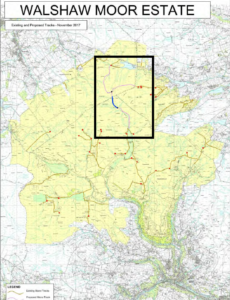 How did NE get into the position of allowing an unlawful Habitats Regualtions Assessment to be done? In this blog I will explain what I think has happened. But let me repeat that it is a serious matter when the government nature conservation agency produces an unlawful Habitats Regulations Assessment – Quis custodiet ipsos custodes? Well, it appears that you and I have to do it. And that’s not right.
How did NE get into the position of allowing an unlawful Habitats Regualtions Assessment to be done? In this blog I will explain what I think has happened. But let me repeat that it is a serious matter when the government nature conservation agency produces an unlawful Habitats Regulations Assessment – Quis custodiet ipsos custodes? Well, it appears that you and I have to do it. And that’s not right.
Let’s work backwards to uncover the political contex in which an unlawful HRA emerged from Natural England. Much of the following seems to be about a track being built but is actually about burning consents, saving face, money and some quite big politics.
Why was the HRA unlawful?: we believe that it was unlawful on several grounds and NE have conceded on one (but we believe that we would have won at least some of the other grounds in court had we got there). NE conceded on the grounds that they didn’t explain their decision well enough (in layman’s terms).
 Why didn’t NE explain their decision well enough?: maybe that will become clear when NE re-do their HRA, but I believe that they couldn’t explain their decision because it was a wrongly-argued and irrational decision. NE would disagree, but that’s what I think. I think that on the basis that what appears to be an earlier version of the HRA, obtained through a Freedom of Information Act request, states that there would be damage caused by the building of a track across blanket bog, but that this was changed to state that there would not be damage, then it is clear that NE was keen to get past this tricky issue and perhaps somehow, someone in NE cut corners or instructed people to cut corners. Or maybe it was just a massive error. Maybe we’ll find out when a new HRA is produced. It has to be said that NE’s apparent insouciance over consenting a 5km track going through a protected area with habitats of high conservation importance is difficult to take. It’s even more difficult to understand when one realises that it seems as though NE had turned down a very, very similar track a few years ago on this site, on this very route. It wasn’t OK then, but it is OK, apparently, now. How odd! It’s almost as though NE is desperate for the track to be built!
Why didn’t NE explain their decision well enough?: maybe that will become clear when NE re-do their HRA, but I believe that they couldn’t explain their decision because it was a wrongly-argued and irrational decision. NE would disagree, but that’s what I think. I think that on the basis that what appears to be an earlier version of the HRA, obtained through a Freedom of Information Act request, states that there would be damage caused by the building of a track across blanket bog, but that this was changed to state that there would not be damage, then it is clear that NE was keen to get past this tricky issue and perhaps somehow, someone in NE cut corners or instructed people to cut corners. Or maybe it was just a massive error. Maybe we’ll find out when a new HRA is produced. It has to be said that NE’s apparent insouciance over consenting a 5km track going through a protected area with habitats of high conservation importance is difficult to take. It’s even more difficult to understand when one realises that it seems as though NE had turned down a very, very similar track a few years ago on this site, on this very route. It wasn’t OK then, but it is OK, apparently, now. How odd! It’s almost as though NE is desperate for the track to be built!
 Why might NE be keen to consent the building of a damaging track through high priority protected habitats?: well, we can see that someone is very keen on this track because the agreement signed between NE and Walshaw Moor Estate specifically says that nothing in the agreement takes force until the track gets planning permission. That is astounding! Someone is very, very keen on that track being built. I guess it’s the estate, don’t you?
Why might NE be keen to consent the building of a damaging track through high priority protected habitats?: well, we can see that someone is very keen on this track because the agreement signed between NE and Walshaw Moor Estate specifically says that nothing in the agreement takes force until the track gets planning permission. That is astounding! Someone is very, very keen on that track being built. I guess it’s the estate, don’t you?
Why is Walshaw Moor Estate so keen on a track being built? I don’t really know, but it seems that they are. The history of the site shows that they are keen on tracks. Maybe the tracks will make grouse shooting easier? I don’t know.
Surely NE is the regulator and ought to be cracking the whip? Why are they bending over backwards to consent a damaging track across protected habitat?: well, I think I do know the answer to that one. Natural England want to revoke the burning consents that apply to Walshaw Moor and 100+ other grouse moors in the north of England and the means of doing this are by agreements where the estates are persuaded to give up their existing consents – so they have to be jollied along. Handing out unlawful consents for new infrastructure might get the grouse moor owners into a good enough mood to sign an agreement on burning.
Why can’t the burning consents be revoked anyway, without agreement?: they can. But the existing consents run for a couple of decades or so and the grouse moor owners don’t want to give up their rights to burn even though the burning rights they have damage protected habitats for wildlife, because they care most about Red Grouse numbers and not wildlife on the moors. So what is the  likelihood that a bunch of grouse moor owners would take legal action against NE if NE withdrew existing burning consents? Very high! I think NE and Defra should man-up and withdraw those consents anyway. But if they did then the grouse moor managers would say that they had invested their energies and money into building up their businesses (the business of shooting wild Red Grouse for fun and profit) on the basis of consents that were given to them by NE and government and they ought to be compensated for losses. They’d argue that the losses would be enormous. NE and Defra have run away from this fight – I’d love to know why but I can only speculate.
likelihood that a bunch of grouse moor owners would take legal action against NE if NE withdrew existing burning consents? Very high! I think NE and Defra should man-up and withdraw those consents anyway. But if they did then the grouse moor managers would say that they had invested their energies and money into building up their businesses (the business of shooting wild Red Grouse for fun and profit) on the basis of consents that were given to them by NE and government and they ought to be compensated for losses. They’d argue that the losses would be enormous. NE and Defra have run away from this fight – I’d love to know why but I can only speculate.
My speculation is that it’s a mixture of things: lack of any real interest in nature conservation values in the higher echelons of NE and its board (not a complete lack of interest, but an overall lack of interest (the good guys are outnumbered by the bad guys)), fear of losing and it costing a lot of money, fear of those influential grouse moor owners cutting up rough in lots of other ways, lack of worry that the wildlife NGOs will be as tough as the grouse moor owners and in some cases, the grouse moor owners are the mates of the party of government so it would attract political attention to annoy these people (see pages 149-57 of Inglorious for examples of correspondence when NE last tried to get tough with these people).
So why is NE trying to revoke these burning consents at all? Why not quietly forget about them?: we know the answer to that! It’s because the European Commission is taking infraction proceedings, or might do, against the UK for damaging EU priority habitats by allowing grouse moor owners to danmage them by burning the blanket bogs.
 Why is the European Commission doing that?: they are doing that because the UK signed up to the Habitats and Birds Directives and it’s one of the jobs of the Commission to stop back-sliding on the deal by Member States. Yes, all Member States try to cheat a bit, some of them a lot, but the Commission can whip them into shape by negotiating and then imposing fines. That is what is happening here. The Commission has told Defra to end the damaging practices or get hefty fines. Little of this in the public domain, but that is what is happening.
Why is the European Commission doing that?: they are doing that because the UK signed up to the Habitats and Birds Directives and it’s one of the jobs of the Commission to stop back-sliding on the deal by Member States. Yes, all Member States try to cheat a bit, some of them a lot, but the Commission can whip them into shape by negotiating and then imposing fines. That is what is happening here. The Commission has told Defra to end the damaging practices or get hefty fines. Little of this in the public domain, but that is what is happening.
Why is the European Commission all fired up about this?: because it’s their job, and also because they were tipped off about the sad state of affairs by the RSPB making a complaint in 2012 and the Hebden Bridge Ban the Burn campaigners taking a complaint of a similar nature in 2012 or very early in 2013. These complaints were focussed on Walshaw Moor but took a wider view too. Most of the traffic between Defra and the EC is secret but I did flush some of it outback in Wuthering moors 34 in September 2013.
So have I got this right? Defra either has to pay big fines to the European Commission for damaging blanket bogs or big compensation to the grouse moor owners so that they don’t damage blanket bogs?: I think so – it seems crazy doesn’t it? Unless they can get the grouse moor owners voluntarily to agree to stop burning blanket bogs, of course.
But why would the grouse moor owners and managers agree voluntarily to stop doing something they really want to do?: good question! Why would they? Either it means that they aren’t so fussed about blanket bog burning as they pretend to be – I think there will be an element of that in it. And/or, they think they can wring other concessions out of NE in the process – maybe like consents for tracks? And/or the agreements aren’t quite as tough as they are made out to be.
Tell me about the last one of those – pretend toughness: pretend toughness is a good term for it. The Walshaw Moor agreement is a good example of pretend toughness. It allows something called ‘restoration burning’of blanket bogs at the estate’s discretion which could easily amount to ‘carry on as you have been chaps’ and it allows burning of heather for Heather Beetle management too (even though there is scant evidence that burning is helpful in this regard apart from in old wives’ tales). In other words the burning consents are revoked, by mutual agreement, but the ability to burn remains through massive loopholes. See Wuthering moors 58 of 13 February this year.
So you believe that Defra and NE are not clamping down on burning but need the cooperation of moorland owners to roll out this charade and it’s all to con the European Commission into believing, or at least accepting, that the UK has got its act together and is no longer allowing priority habitats to be damaged by burning?: yes, that’s what I think is happening.
So when I asked why did NE produce an unlawful HRA particularly for the construction of a track the short answer is: NE needed to consent the track to get the estate to sign the plan that makes it look as though burning is being controlled and to get the European Commission off the UK’s back?: yes, that’s what I think.

But won’t something like this have to happen on lots of estates across the country for it to work?: yes, so it’s good that we have highlighted this one! Defra may be hoping that the European Commission will start to lose interest when it thinks that it has made some progress. Or maybe Mr Gove is simply promising all that when we leave the EU this or another government will dump this stuff and gives moorland managers carte blanche.
That wouldn’t happen would it?: I am sure that the Commission has been tipped off and I bet they will read this blog. But leaving the EU, and watering down environmental protection – that’s what some strong Brexiteers want, and that’s what we might well get. I didn’t vote for it.
So what should we do?: I’ll come back to that soon. But just take a while, as I am, to celebrate the stick we stuck in the spokes of NE’s wheels yesterday. It was us – we derailed this part of the plan. There are some bruised people out there. Gather ye sticks! More bruising needed!
[registration_form]
This is an excellent example of Natural England’s ‘outcomes approach’ as described in its conservation strategy ‘Conservation 21’ – and as discussed in my recent guest blog. Your assessment of what is happening here is a near perfect fit for the approach set out in that strategy – a strategy much loved by NE’s senior managers. As the strategy makes clear even the statutory aspects of NE’s role as a regulator are up for grabs and can be conceded (or ‘aligned’) to help meet a landowner’s objectives.
I’ve long found that cock up rather than conspiracy lies behind most stupid miscalculations. But in this case…
Well done Mark! It’s certainly the best £25 I’ve spent for a long time
Many would be conspirators are aware of how well known the adage about cock up and malice is, and take advantage of reasonable people trying to appear reasonable by reciting it, which means malice and conspiracy is probably a lot more widespread under the blanket of plausible idiocy than is currently credited. In the current climate it is probably best to assume malice until cock up can be definitively established.
Jbc – Though in this case we have an NE strategy which is very up front about how they will seek to operate – for example:
‘We need to understand how to align statutory conservation ambitions with the wider objectives of the people we depend on to achieve them in any given place. We need to become more fluent in other people’s language.’
So I think it’s probably ok to settle on ‘conspiracy’ in this case.
A tremendously useful analysis, Mark. I do hope it will help other action to be taken – and especially to prompt us all to press for strong regulatory / enforcement powers post-Brexit. Thanks.
If Defra has to compensate grouse moor owners for not damaging blanket bogs then perhaps those living in places which seem to be under greater risk from flooding due the management of nearby grouse moors could sue for any monies thus gained!
A great and valid point John .
Thanks for this Mark…there was me thinking this track was all about waders, because waders are important and that’s what I keep hearing, it’s all about the waders because waders need everyone’s help and a great big track for the emergency assistance of an egg bound curlew is vital for waders. It’s waders, remember. Waders!
As Basil Fawlty might have said, ‘don’t mention the grouse!’
Martin Harper 29 Apr 2016
‘Over the coming days we will see an intensification of the rhetoric from both perspectives. I fully anticipate repeated and sustained pressure for the RSPB to join calls for a ban. That is not our position……
But now through the Hen Harrier Action Plan and this European Commission led process there is a chance of real progress. The challenge is now with DEFRA, Natural England and the driven grouse industry to respond constructively to the growing evidence that change is needed, and to do so positively’
http://ww2.rspb.org.uk/community/ourwork/b/martinharper/archive/2016/04/29/england-39-s-moors-a-burning-issue.aspx
Martin’s blog reads now like even more proof that a ban is the only solution.
Further more i can’t imagine a tory England enforcing the Habitats Directive after Brexit.
For those who think i’m RSPB bashing there was another excellent comment from Ian Thompson yesterday on another ‘missing’ eagle
https://raptorpersecutionscotland.wordpress.com/2018/05/10/satellite-tagged-sea-eagle-disappears-on-invercauld-estate-in-cairngorms-national-park/
There was an article in the Guardian today which is relevant.
https://www.theguardian.com/environment/2018/may/12/peers-to-rebel-over-toothless-environment-watchdog-brexit
At the risk of appearing even more sycophantic than usual, I think this is a really well-argued piece. You’ve managed to paint the big issues in suitably strident, black-and-white terms, but you’ve also got a good eye for the subtleties of how organisations wrangle and weasel their way around awkward truths and situations.
I only hope that the rapid concession by NE on this one point doesn’t take the heat off all the other shameful things they’re up to.
I think your analysis is spot on…though I suspect that behind it all is the Tory government protecting the interests of its friends and donors. NE’s lack of independence (and fear of even deeper cuts and/or abolition) is clearly a massive problem.
Agree totally with the need for us all to be pressing for proper independent regulation post Brexit.
Great work (again) Mark. Thanks.
Thank you Mark – this has been happening in NI for a long time – since 1998 (time of Good Friday Agreement!). We do not have an EPA nor legislation to protect our environment (NI legislation is further watered down from UK laws).
Now with Brexit the main port in C’ford Lough (closest to Sellafield) is extending and new roads built through our countryside to facilitate this expansion. Timely with the nuclear disposal site programme coming here!
We have no protection at all and are stopped from taking decisions to EU level (and Supreme Court) on the environment. To your question of “why?” is this an area of granite or salt mines? are there any PDR for quarries? these are questions you need answers to.
C